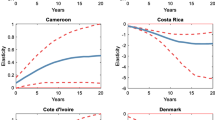Abstract.
This paper develops a nonlinear vector autoregression of inflation and money growth subject to changes in regime. The regimes are fully characterized by the mean and variance of inflation and are conjectured to be the result of alternative government policies. Agents are unable to observe directly whether government actions are indeed consistent with the inflation rate targeted as part of a stabilization program. However, as part of their money demand decision, agents construct probability inferences regarding the regime. Government announcements are assumed to provide agents with additional, possibly truthful information regarding the regime.
This specification is estimated using data from the Israeli and Argentine high-inflation periods. Results indicate that the successful stabilization program implemented in Israel in July 1985 was more credible than either the earlier Israeli attempt in November 1984 or the Argentine programs. Government's signaling might simplify the agents' inference problem and increase the speed of their learning but, under certain conditions, it might also increase inflation volatility. Welfare gains from a temporary increase in real balances might be high enough to induce agents to raise their money demand in the short-term even if they are uncertain about the nature of government policy and the eventual outcome of the stabilization attempt. Statistically, the model restrictions cannot be rejected at the 1% significance level.
Similar content being viewed by others
Author information
Authors and Affiliations
Additional information
First version received: August 1998/Final version received: January 1999
Rights and permissions
About this article
Cite this article
Ruge-Murcia, F. The effects of learning and signaling on money demand: With an application to heterodox inflation stabilization programs. Empirical Economics 25, 61–91 (2000). https://doi.org/10.1007/s001810050004
Issue Date:
DOI: https://doi.org/10.1007/s001810050004




